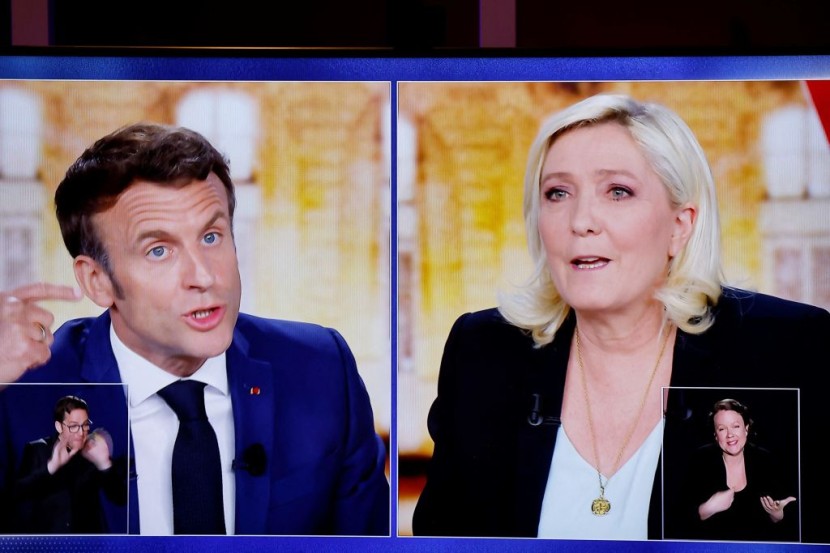
French President Emmanuel Macron and opponent Marine Le Pen will go back to the campaign trail on Thursday following an intense TV debate between the two final presidential candidates ahead of Sunday's second-round run-off elections,
According to an Elabe poll for BFM TV, viewers of the only debate between the two remaining contenders on Wednesday evening thought a combative Macron was arrogant but also regarded him as more compelling and ready to be president, per Reuters report.
The study found that Le Pen, who concentrated on expressing empathy for those she said had "suffered" since Macron's election in 2017, was marginally more in step with voters' worries, but her far-right ideologies were still seen as far more concerning.
During the face-off, Macron attacked Le Pen's connection with Russian President Vladimir Putin's administration, as well as her economic proposals and European Union policy.
French Presidential Debate Impact
With the election just four days away, a snap survey for BFM TV indicated that 59 percent of viewers deemed Macron to be the most persuasive in the discussion, implying that the nearly three-hour confrontation would not change the outcome of the race, with Macron leading in all previous polls.
Since the first round on April 10, polls have shown a widening of Macron's margin over Le Pen to as much as 56% to 44 %, and observers predicted the debate was unlikely to sway voting preferences in Le Pen's favor, as per a Yahoo! News report.
Though the incumbent French president's lead is growing in the surveys, current numbers are much narrower than five years ago, when he won over Le Pen by garnering 66.1% of the vote.
"Although Macron's roughly 10-point lead in the polls is well ahead of any conceivable margin of error, recent history is littered with shock election results," said Dean Turner, Chief Eurozone and UK Economist at UBS Global Wealth Management's Chief Investment Officer. He added that it is "naive" to assume that Le Pen will not be able to pull off a "surprise" victory.
Crucial Campaign Stretch
On Thursday, Macron will campaign in the Paris suburb of Seine-Saint-Denis, a critical battleground for both candidates because voters in the area overwhelmingly voted for hard-left candidate Jean-Luc Melenchon in the first round.
Le Pen will travel to northern France, where she will host an evening rally in Arras, a town that voted marginally more for Macron in an otherwise far-right-dominated region. It's uncertain whether the final two days of campaigning will affect the outcome of the election.
BBC reported that Macron's stringent Covid measures turned off many voters, and he was criticized for functioning as a "president for the rich." He is more popular in the big cities, but his pro-EU liberal and global stance have won him backing from other mainstream left and right parties.
Le Pen toned down her nationalist, anti-EU rhetoric during the campaign, but her goal remains to renegotiate France's relationship with the European Union, as she emphasized in the debate.
Whoever wins on Sunday will have achieved so only after a difficult, divided campaign, which could jeopardize their ability to secure a parliamentary majority and execute changes.
If Macron wins, as polls predict, he would face a challenging second term, with voters of all colors expected to protest his desire to pursue his pro-business initiatives.
If Le Pen wins, France's domestic and foreign policy are likely to shift dramatically, and street protests could start soon.
Related Article: Fears Rise Over Russia's Potential Use of Tactical Nukes in Ukraine; Vladimir Putin's Aide Says New ICBM Test Is a Gift to NATO, Kyiv Sponsors








